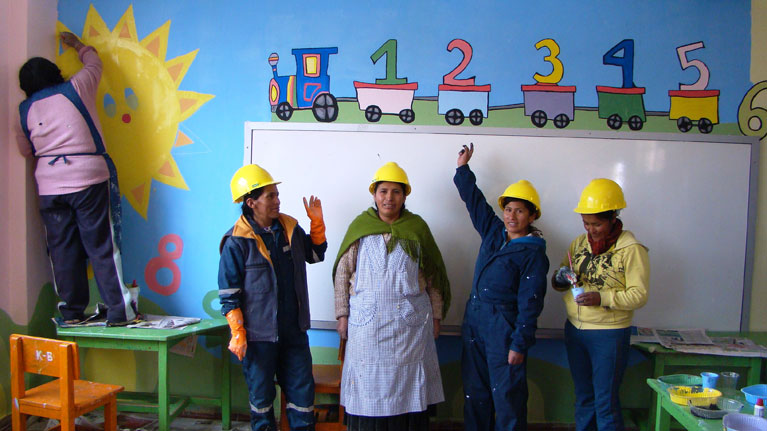Our impact, their voices
Women are building their own futures in Bolivia
A group of 250 freelance women builders from La Paz and El Alto have improved their working conditions and are able to spend more time with their families by working directly with employers.

"They made me work for free, without pay. At that time, I decided to consider my job as a practice. But if I had known my rights at work then, I would have been able to complain, but this was not the case. That's why I decided to work on my own account," she said.
They made me work for free, without pay. But if I had known my rights at work then, I would have been able to complain."
Lidia Romero
The women builders offer various services, including painting, masonry, plumbing, electrical installations, facade cladding and sometimes even carpentry. Once they are offered a contract, they quote a price for the work and if the person agrees the work is done.
Lidia said that because of her bad experiences with informal contractors, she never starts a new job without first signing a contract that provides the most relevant details for the provision of her services. In addition, the contract allows the employer to feel more comfortable and confident that she and her colleagues will carry out the work in full as agreed.
"This way of working has enabled me and my colleagues to have flexibility in our working time in order to fulfil other personal obligations, such as household chores or to take care of our children, something that was not possible when we were working for informal contractors," she said.
Occupational safety and health
Safety and health at work is also a very important issue for women working in the construction sector. Lidia said that the training material and talks related to this issue have been essential for them."Many women in this area are single mothers. Their children depend only on them, so it is essential to ensure optimal working conditions to perform our duties without any risks," she added.
During the last few years, Lidia gained experience at work and is now an active member of the Association of Women Construction Workers (ASOMUC), a municipal alliance. She, along with this Association and representatives of trade unions in the industry, have received training in technical areas and occupational safety and health.
The training activities were organized by the International Labour Organization (ILO), the NGO Habitat Network and the municipal governments of the cities of La Paz and El Alto, through the projects "Building Equality", supported by the Swedish International Development Cooperation Agency (SIDA) and "Women in Construction Towards Their Political and Economic Empowerment", funded by the Gender Equality Fund of UN Women.
Some 250 women working in the construction industry have benefited from these projects. Most of them are indigenous women who had very little access to formal education or vocational training.

For her, receiving ILO support in the field of occupational safety and health was very important for the performance of her daily activities.
"We have been taught what kind of tools we can ask for in a construction job, not only do you have to go with your own toolbox, but if I am going up high I have to ask for a harness, and when exposed to oil paint, I need something to cover my mouth and nose.”
Lidia also participated in an ILO training on labour rights and international labour standards for women builders in 2016. "It's not just about learning how to do things, but about knowing your rights so they do not take advantage of you.”
Future action
Currently, Lidia Romero is registered in the first labour market of women builders in the sector created by the ILO and by the employers' association of the construction sector in Bolivia. The goal is to increase the visibility of women builders and facilitate their access to job opportunities.Rodrigo Mogrovejo, the ILO's National Coordinator in Bolivia, stressed the importance of connecting the training centre with the employer’s organization for the sector, so that the women, who have been trained, can get decent jobs in companies that require their services.
[Construction workers] represent a growing workforce that is bringing more and more women to the construction sector in Bolivia."
Rodrigo Mogrovejo, ILO's National Coordinator in Bolivia
In La Paz, participation in the construction sector has increased from 5.2 per cent to 6.4 per cent of the total workforce in recent years. The number of women rose from 0.49 per cent to 1.5 per cent, and men from 9.3 per cent to 10.9 per cent.
In the neighbouring city of El Alto, the share rose from 8.2 per cent to 9.1 per cent of the total workforce. The number of women grew from 0.6 per cent to 1.7 per cent, and men from 13.4 per cent to 15.4 per cent.
Many of the women are single mothers with few resources. They struggle day by day to stand out in jobs mostly occupied by men, and for better working conditions when they are hired.
"This is one of the main reasons why this population was chosen. They represent a growing workforce that is bringing more and more women to the construction sector in Bolivia," Mogrovejo said.